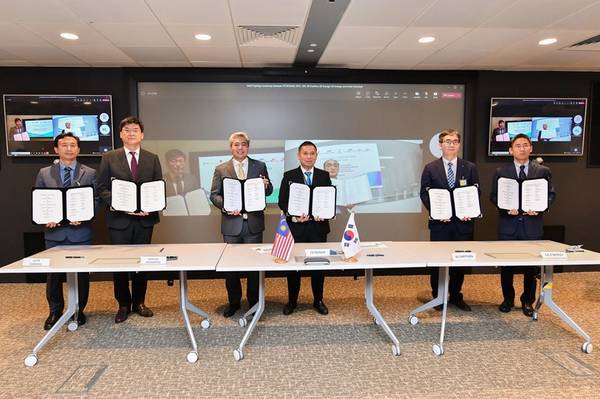
Six South Korean companies and Malaysian state-owned energy company Petronas have agreed to work together to look at the feasibility of a cross border carbon capture and storage project in what's been called Asia’s first CCS hub project.
Under a memorandum of understanding (MOU), Korean companies Samsung Engineering, Samsung Heavy Industries, SK Earthon, SK Energy, GS Energy Corporation and Lotte Chemical will work with Petronas across the full carbon capture and storage cycle chain.
The so-called Shepherd CCS Project will capture CO2 emitted from industrial complex sources in Korea and then transport the captured CO2 to Malaysia to store it in the Southeast Asian country. This would be Asia’s first CCS hub project with a goal of developing the entire value chain at once.
The MoU will involve the search for and evaluation of potential CO2 storage sites in Malaysia and exploration of other areas across the CCS value chain, including the strengthening of cross-border CO2 transportation.
"Due to the lack of adequate space for CO2 storage within South Korea, it is imperative to secure storage sites outside its territory, and Malaysia stands out as the best option for its global storage capacity and its geographical accessibility with South Korea," says SK.
"In this project, Samsung Engineering will manage the business development as well as the hub. Meanwhile, Lotte Chemical, GS Energy, and SK Energy will handle the CO2 capturing and the hub. Transportation shall be entrusted to Samsung Heavy Industry, while SK Earthon and Petronas will oversee the exploration, selection, and operation of the storage."
Hong Jeong-eui, Head of Net Zero Office, SK Energy, said, “CCS is becoming the requisite measure for achieving carbon neutrality across the globe. Moreover, the method of capturing the CO2 from various sources and storing together (Hub & Cluster Method) is in the limelight, especially in Europe. The geographical difference in capturing location and storage is expected to vitalize international shipping and overseas storage. In line with this, we will make sure that the cross-border cooperation achieves success in every process of the value chain.”
Han Young-ju, Head of E&P Tech. Center, SK Earthon, shared, “The feasibility study will be conducted in the area near the SK427 block, of which we recently acquired the operatorship. This project marks the first for SK Earthon to link our Upstream strategy and CCS project and create a synergy effect. The acquirement of the storage is significant to the completion of the overall value chain. Thus, we will do our best to secure the storage by utilizing our over 40 years of experience and technological capabilities.”
Emry Hisham, Head of Carbon Management, Petronas, said that this cooperation enabled a close collaboration with South Korean companies in order to develop its action plan for Net-Zero. “The feasibility studies undertaken through this collaboration will identify suitable technologies for the CCS and transportation value chain, bringing Petronas closer towards establishing Malaysia as a leading regional CCS solutions hub,” he added.